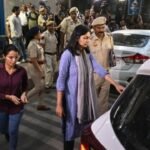KOLKATA: Calcutta high court struck down on Wednesday all new OBC categorisations in Bengal after 2010, saying the authorities had “practised protective discrimination in deviation of constitutional norms”.
The verdict could result in the cancellation of around 5 lakh OBC certificates, though the court clarified that reservation beneficiaries who were in service or those already selected for recruitment wouldn’t be affected by the order.
“No data was disclosed on the basis of which it was ascertained that the community concerned is not adequately represented in services under Bengal govt,” the division bench of Justices Tapabrata Chakraborty and Rajasekhar Mantha said while hearing a batch of PILs challenging the identification and classification of 77 groups as OBCs.
“A class is declared as OBC not only because it is backward, based on scientific and identifiable data, but also on the basis of such class being inadequately represented in the services under the state. Such inadequacy is required to be assessed vis-a-vis the population as a whole including other unreserved classes,” the order states.
The bench left untouched 66 OBC categories that had been notified prior to 2010.
The ruling effectively invalidates all OBC certificates given out by successive TMC govts since the party first came to office in 2011.
WB govt ‘acted in undue haste’ onOBC categorisation, says HC
The verdict points out that the state government’s unilateral OBC categorisation breached the protocol of consulting the backward classes commission. It says any report recommending categorisation should have been placed in the legislature, with recommendations for new inclusions and exclusions.
At the hearing, the judges questioned provisions of the West Bengal Backward Classes Act, 2012, that allowed the state govt to include new categories under the OBC A and B lists through a gazette notification.
Their ruling mentions that the legislation provided the state govt with “carte blanche authority in respect of specifying or declaring classes as backward, (and) who may be entitled to reservation”. It also notes “a complete lack of legislative policy” within the ambit of the Act. “The legislature has to lay down the legislative policy and principle to afford guidance for carrying out the said policy before it delegates its subsidiary powers on its behalf.”
The order points out that within six months of Bengal announcing 10% reservation for backward Muslims in 2010, the state backward classes commission recommended 42 groups as OBC, of which 41 communities were Muslim.
“Following such a recommendation, the state immediately included the same in the list. Thereafter, vide memo number 1673 dated May 11, 2012, the state further included 35 classes (9 in the OBC-A category and 26 in OBC-B),” the order states.
The court observed that the commission and the state govt “acted in undue haste, and with lightning speed, in making recommendations for the classification of 77 classes to make the public announcement of the chief minister a reality”.
CM Mamata Banerjee had made the announcement at a political rally. “No proper inquiry was conducted by the commission inviting application for inclusion in the lists, and even after purported preparation of the list, no notification was issued inviting objections in general from the people at large,” the petitioners said.
The HC ruling states that “as a model employer, the state govt must conduct itself with high probity and candour, and ensure that the populace does not succumb to any discriminatory practice in the procedural rigmarole”.
The court rejected the state govt’s plea for a stay on the order till it drew up a response.
The verdict could result in the cancellation of around 5 lakh OBC certificates, though the court clarified that reservation beneficiaries who were in service or those already selected for recruitment wouldn’t be affected by the order.
“No data was disclosed on the basis of which it was ascertained that the community concerned is not adequately represented in services under Bengal govt,” the division bench of Justices Tapabrata Chakraborty and Rajasekhar Mantha said while hearing a batch of PILs challenging the identification and classification of 77 groups as OBCs.
“A class is declared as OBC not only because it is backward, based on scientific and identifiable data, but also on the basis of such class being inadequately represented in the services under the state. Such inadequacy is required to be assessed vis-a-vis the population as a whole including other unreserved classes,” the order states.
The bench left untouched 66 OBC categories that had been notified prior to 2010.
The ruling effectively invalidates all OBC certificates given out by successive TMC govts since the party first came to office in 2011.
WB govt ‘acted in undue haste’ onOBC categorisation, says HC
The verdict points out that the state government’s unilateral OBC categorisation breached the protocol of consulting the backward classes commission. It says any report recommending categorisation should have been placed in the legislature, with recommendations for new inclusions and exclusions.
At the hearing, the judges questioned provisions of the West Bengal Backward Classes Act, 2012, that allowed the state govt to include new categories under the OBC A and B lists through a gazette notification.
Their ruling mentions that the legislation provided the state govt with “carte blanche authority in respect of specifying or declaring classes as backward, (and) who may be entitled to reservation”. It also notes “a complete lack of legislative policy” within the ambit of the Act. “The legislature has to lay down the legislative policy and principle to afford guidance for carrying out the said policy before it delegates its subsidiary powers on its behalf.”
The order points out that within six months of Bengal announcing 10% reservation for backward Muslims in 2010, the state backward classes commission recommended 42 groups as OBC, of which 41 communities were Muslim.
“Following such a recommendation, the state immediately included the same in the list. Thereafter, vide memo number 1673 dated May 11, 2012, the state further included 35 classes (9 in the OBC-A category and 26 in OBC-B),” the order states.
The court observed that the commission and the state govt “acted in undue haste, and with lightning speed, in making recommendations for the classification of 77 classes to make the public announcement of the chief minister a reality”.
CM Mamata Banerjee had made the announcement at a political rally. “No proper inquiry was conducted by the commission inviting application for inclusion in the lists, and even after purported preparation of the list, no notification was issued inviting objections in general from the people at large,” the petitioners said.
The HC ruling states that “as a model employer, the state govt must conduct itself with high probity and candour, and ensure that the populace does not succumb to any discriminatory practice in the procedural rigmarole”.
The court rejected the state govt’s plea for a stay on the order till it drew up a response.








